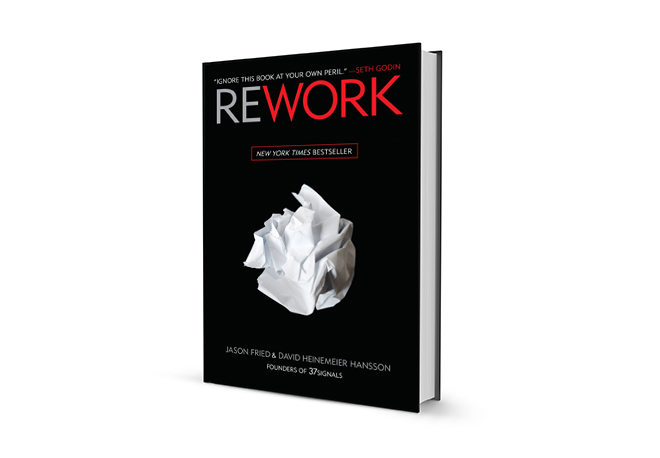I recently read the book Rework by the founders of 37signals – the company behind the highly successful SaaS tool Basecamp. (Since publication of the book, the entire company name has been changed to Basecamp.) While the book does contain some ideas that are actually not that revolutionary, and while some of the points made actually seem a bit contradictory, my general feeling is that this is most certainly a book worthy of any business professional’s time.
The book begins with an injunction to decentralize, embrace the global workplace, and disregard those people who like to tell you that your ideas will not work “in the real world”. Cast against the background of the success of 37signals and their proven ability to build a strong and vibrant company in the face of the naysayers and outdated concepts of best practices, many readers will find themselves immediately engaged with the text.
However, the book also begins with a warning that readers will feel the need to argue with many of the controversial points made, and it did not take long for that to happen with me. The biggest point of opposition I realized was in the declaration that businesses should learn from successes rather than failures. This declaration strikes me as unnecessarily controversial and ultimately counter-productive. It is made in an attempt to be revolutionary and optimistic, but in reality, it is neither.
When people say that failures are good because you learn from them, it’s not because they actually like failure. They say it because they know that failure is inevitable at some level, and successful people are successful because they make the most of it.
Perhaps most importantly, though, this attitude of complete avoidance of failure is actually a contradiction of the previous point about disregarding the naysayers. The people who want to avoid failure at all costs are the same people who do not want to take any risks and declare that all new ideas would never work “in the real world”. So which is it? Should we focus only on learning from success, or should we be willing to depart from common consensus and take some risks? You have to choose one.
Another more controversial point made in the book is that planning is just guessing anyway, so you should not even bother with it. This is kind of an extreme position that has its merit, but Rework presents it in a manner that seems unnecessarily extreme. It is true that obsession with planning certainly leads to unrealistic expectations, and it shackles you from improvising. A plan should not shackle you to the point that it keeps you from improvising.
However, but people who plan well are usually better at improvising because they have considered various eventualities and have given some thought to how they would respond under various circumstances. Poor planning assumes all kinds of variables and charts one single possible course. Good planning accounts for all kinds of variables and considers multiple possible courses.
The author says that plans often have “no relationship with reality”, but the thing is that good planning will help you to gain a better grasp on reality through analysis and simple math. The reality is that everyone who takes action always has a plan. Poorly formed plans have a tendency to lead to unrealistic expectations, and unrealistic expectations wreck companies.
That said, taking imperfect action is still often better than taking no action at all, and on that point, I agree.
Another somewhat controversial point made in the book is that you should basically ignore your competitors. The idea is that you and they are intrinsically different. You should not want to be them; trying to be them will inevitably lead to failure.
At this point, though, the authors make a statement that seems outright laughable for any pragmatic business person: “Even if you wind up losing, it’s better to go down fighting for what you believe in instead of just imitating others.” So first we are told that we should not try to be others because we will inevitably fail…and then we are told that we should not worry about failure. So…which is it?
In reality, it is very difficult to reinvent the wheel and bring something completely new and unheard of to the market. Truth be told, the folks at Basecamp have not even done that. I have used Basecamp. I have also used competing products including Trello, Wrike, and LiquidPlanner. While the visual format of Basecamp is certainly unique, the general concept is not all that different. In this way, we see that most businesses do not actually succeed by doing something completely different, but by doing the same thing a little better.
Despite my points of disagreement, I did find this book to be a good read. Its points about leveraging real engagement, saying no by default, hiring people who are good writers, focusing on building a rockstar environment instead of hiring individual rockstars, minimalism and simplicity in product design, staying away from investor dollars and the startup fairytale, etc., all resonated with me. The book has contains some points that I consider weak specifically because the authors took their own advice: they took some risks. A good business book should be controversial, and Rework is certainly that. It has certainly caused me to rethink the way I look at my business, and for that reason, I would recommend it to any executive or business owner.





